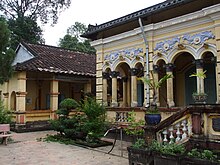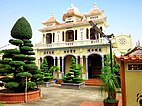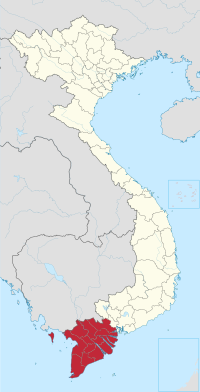Cần Thơ
Cần Thơ
Phong Dinh | |
|---|---|
| City of Cần Thơ Thành phố Cần Thơ | |
| Nickname: Western Metropolis (Tây Đô) | |
 | |
 | |
| Coordinates: 10°02′N 105°47′E / 10.033°N 105.783°E | |
| Country | |
| Region | Mekong Delta |
| Founded | 1789 |
| Seat | Ninh Kiều |
| Subdivision | 5 urban districts, 4 rural districts |
| Government | |
| • Type | Municipality (Class-1) |
| • Body | Cần Thơ People's Council |
| • Secretary of the Party | Lê Quang Mạnh |
| • Chairman of People's Council | Phạm Văn Hiểu |
| • Chairman of People's Committee | Trần Việt Trường |
| Area | |
| 1,440.40 km2 (556.14 sq mi) | |
| Population | |
| 1.507.187 | |
| • Density | 1.046/km2 (2.71/sq mi) |
| • Urban [2]: 116 | 994.704 |
| • Rural [2]: 118 | 513.483 |
| Ethnic groups | |
| • Vietnamese[4] | 97.47% |
| • Khmer | 1.59% |
| • Hoa | 0.88% |
| • Others | 0.06% |
| GDP [5] | |
| • Total | VND 107.695 trillion US$ 4.680 billion |
| Time zone | UTC+07:00 (ICT) |
| Postal code | 94xxx |
| Area codes | 292 |
| ISO 3166 code | VN-CT |
| License plate | 65 |
| HDI (2020) | (16th) |
| Climate | Aw |
| International airports | Can Tho International Airport |
| Website | cantho.gov.vn |
Cần Thơ, anglicized as Can Tho or Cantho, is the fourth-largest city in Vietnam, and the largest city along the Mekong Delta region in Vietnam.[7][8]
It is noted for its floating markets, rice paper-making village, and picturesque rural canals.[8] It has a population of around 1.507.187 as of 2024,[9] and is located on the south bank of the Hậu River, a distributary of the Mekong River. In 2007, about 50 people died when the Cần Thơ Bridge collapsed, causing Vietnam's worst engineering disaster.[10] In 2011, Cần Thơ International Airport opened.[11]
The city is nicknamed the "Western Metropolis" (Tây Đô / 西都), and is located 169 kilometres (105 miles) from Hồ Chí Minh City.
History
[edit]During the Vietnam War, Cần Thơ was the home of the ARVN IV Corps capital. The ARVN 21st division was dedicated to protect the city of Cần Thơ, including the provinces of Chương Thiện (now in Hậu Giang), Bạc Liêu, An Xuyen (Cà Mau), Ba Xuyen (Soc Trang), and Kiên Giang. Before 1975, Cần Thơ was part of Phong Dinh province. On November 1, 1955, the third Light Division changed into the thirteenth Light Division, and the fifteenth, twelfth, and 106th regiments transformed into the 37th, 38th, and 39th regiments. The 37th and 38th Regiments consisted of battalions that originated in the present MR 3. The 39th regiment consisted of battalions from My Tho and Sa Dec in the Delta. The 39th Regiment participated in the successful campaigns against dissidents in Hua Hau in 1955–1956.
Administrative system
[edit]The city is an independent municipality at the same level as the other provinces of Vietnam. It was created in the beginning of 2004 by a split of the former Cần Thơ Province into two new administrative units: Cần Thơ City and Hậu Giang Province.
Cần Thơ is subdivided into nine district-level sub-divisions:
- 4 rural districts:
They are further subdivided into five commune-level towns (or townlets), 36 communes, and 44 wards.
Ninh Kiều, which has the well-known Ninh Kiều port, is the central district and also the most populated and wealthiest of these districts.[12]
The city borders the provinces of An Giang, Hậu Giang, Kiên Giang, Vĩnh Long and Đồng Tháp.
Transportation
[edit]
Before 1975, National Highway 4 (now National Route 1) bypassed the ferry from Binh Minh, VL to Cần Thơ where the ARVN 21st division patrolled heavily the ferry transportation to protect the civilians and ship merchants. South of the National Highway 4 from Cần Thơ to Ba Xuyen province (Soc Trang) were mainly heavily patrolled by ARVN soldiers to prevent route disruption.
Today, Cần Thơ is connected to the rest of the country by National Route 1A and Cần Thơ International Airport. The city's bridge, which is now completed, is the longest cable-stayed bridge in Southeast Asia. The six-lane Saigon–Cần Thơ Expressway is being built in parts [clarification needed] from Hồ Chí Minh City to Mỹ Tho. Hydrofoil express boats link this city with Hồ Chí Minh City.[citation needed] From Phú Quốc island, tourists can use the ferry, passenger bus or taxi to transfer to Cần Thơ.[13] There are many vehicles such as taxis, Grab motorbikes, buses, vans and coaches.
Tourism
[edit]
The Mekong Delta is considered to be the "rice basket of Vietnam", contributing more than half of the nation's rice production. People say of Cần Thơ:
Cần Thơ gạo trắng nước trong,
Ai đi đến đó lòng không muốn về.
Cần Thơ with its white rice and clear waters.
For those who visit, who would ever want to leave.
Cần Thơ (shared with Hậu Giang) is famous for its floating markets, especially Cai Rang Floating Market, where people sell and buy things on the river, as well as the bird gardens and the port of Ninh Kiều. The city offers a wide range of tropical fruits such as pomelo, longan, jackfruit, mango, guava, banana, rambutan, mangosteen, dragon fruit and durian. The Cần Thơ City Museum has exhibits on the city's history.[14]
Tourist attractions:
- Cần Thơ Bridge
- Thiền viện Trúc Lâm Phương Nam (Buddhist temple)
- Nam Nhã Pagoda
- Bình Thủy Temple
- The historic Bình Thủy house (nhà cổ Bình Thủy, 1870): a mix of French and Asian architecture
- Ninh Kiều Quay
- Cần Thơ pedestrian bridge
- Cái Răng Floating Market & Phong Điền Floating Market
- Bằng Lăng Stork Sanctuary (Thốt Nốt district)
- Canal tour
- Cần Thơ Cathedral
- Ông Chinese Pagoda
- Pitu Khôsa Răngsây Khmer Pagoda
- Quang Đức Pagoda
- Long Quang Pagoda[citation needed]
- Lưu Hữu Phước Park[15]
- Phật Học Pagoda[16]
- Mỹ Khánh tourist village
- Cần Thơ seminary

Education
[edit]Academic institutions in the city are Cần Thơ University, Cần Thơ Department of Education and Training, Cần Thơ University of Medicine and Pharmacy, Tây Đô University, Nam Cần Thơ University, Cần Thơ College, College of Foreign Economic Relations – Cần Thơ Branch, Medical College, Singapore International School at Can Tho,[17] Cần Thơ Technical Economic College[18] and Vocational College, with its well-known College of Agriculture and Mekong Delta Rice Research Institute, Cần Thơ University of Technology.[citation needed]
Climate
[edit]Under the Köppen climate classification, Cần Thơ has a tropical wet and dry climate (Aw). Cần Thơ's climate features two seasons: rainy (from May to November) and dry (from December to April). Average annual humidity is 83%, rainfall 1,800 mm (71 in) and temperature 27 °C (81 °F).
| Climate data for Cần Thơ | |||||||||||||
|---|---|---|---|---|---|---|---|---|---|---|---|---|---|
| Month | Jan | Feb | Mar | Apr | May | Jun | Jul | Aug | Sep | Oct | Nov | Dec | Year |
| Record high °C (°F) | 34.2 (93.6) |
35.2 (95.4) |
38.5 (101.3) |
40.0 (104.0) |
38.3 (100.9) |
37.3 (99.1) |
36.8 (98.2) |
35.5 (95.9) |
35.2 (95.4) |
35.8 (96.4) |
34.7 (94.5) |
34.0 (93.2) |
40.0 (104.0) |
| Mean daily maximum °C (°F) | 30.2 (86.4) |
31.2 (88.2) |
32.7 (90.9) |
33.9 (93.0) |
33.2 (91.8) |
32.0 (89.6) |
31.4 (88.5) |
31.2 (88.2) |
31.1 (88.0) |
31.0 (87.8) |
30.7 (87.3) |
29.7 (85.5) |
31.5 (88.7) |
| Daily mean °C (°F) | 25.4 (77.7) |
26.1 (79.0) |
27.3 (81.1) |
28.5 (83.3) |
28.0 (82.4) |
27.3 (81.1) |
26.9 (80.4) |
26.8 (80.2) |
26.8 (80.2) |
26.9 (80.4) |
26.9 (80.4) |
25.7 (78.3) |
26.9 (80.4) |
| Mean daily minimum °C (°F) | 22.3 (72.1) |
22.7 (72.9) |
23.9 (75.0) |
25.0 (77.0) |
25.2 (77.4) |
24.6 (76.3) |
24.3 (75.7) |
24.4 (75.9) |
24.4 (75.9) |
24.4 (75.9) |
24.3 (75.7) |
23.0 (73.4) |
24.1 (75.4) |
| Record low °C (°F) | 14.8 (58.6) |
17.3 (63.1) |
17.5 (63.5) |
19.2 (66.6) |
18.7 (65.7) |
19.0 (66.2) |
19.5 (67.1) |
19.7 (67.5) |
17.8 (64.0) |
18.7 (65.7) |
17.5 (63.5) |
16.5 (61.7) |
14.8 (58.6) |
| Average rainfall mm (inches) | 10.0 (0.39) |
3.8 (0.15) |
15.4 (0.61) |
41.8 (1.65) |
223.0 (8.78) |
309.7 (12.19) |
336.0 (13.23) |
337.9 (13.30) |
451.4 (17.77) |
300.9 (11.85) |
137.1 (5.40) |
41.5 (1.63) |
1,967.5 (77.46) |
| Average rainy days | 2.0 | 0.8 | 1.8 | 5.6 | 16.4 | 19.9 | 21.5 | 21.6 | 22.1 | 21.8 | 13.6 | 6.5 | 153.3 |
| Average relative humidity (%) | 80.9 | 79.4 | 77.9 | 78.2 | 83.7 | 86.0 | 86.2 | 87.0 | 87.1 | 86.2 | 84.3 | 82.1 | 83.4 |
| Mean monthly sunshine hours | 244.9 | 243.0 | 280.8 | 258.8 | 210.3 | 175.8 | 183.2 | 179.5 | 165.9 | 178.0 | 192.7 | 215.3 | 2,524.3 |
| Source: Vietnam Institute for Building Science and Technology[19] | |||||||||||||
Economy
[edit]After 120 years of development, the city now[when?] is the delta's most important center of economics, culture, science, and technology. It has a large freshwater port and two industrial parks. [citation needed]
Twin towns – sister cities
[edit]
Notable people
[edit]- Lưu Hữu Phước (1921–1989), composer
- Nguyễn Huỳnh Kim Duyên (born 1995), beauty queen and model, 2nd Runner-up Miss Supranational 2022
- Lana Condor (born 1997), actress
Gallery
[edit]-
Cần Thơ market
-
Museum of People's Armed Forces
References
[edit]- ^ Biểu số 4.6: Hiện trạng sử dụng đất vùng Đồng Bằng Sông Cửu Long năm 2022 [Table 4.6: Current land use status in the Mekong Delta in 2022] (PDF) (Decision 3048/QĐ-BTNMT) (in Vietnamese). Ministry of Natural Resources and Environment (Vietnam). 18 October 2023. – the data in the report are in hectares, rounded to integers
- ^ a b c General Statistics Office of Vietnam (2023). Statistical Yearbook of Vietnam 2022 (PDF). Statistical Publishing House (Vietnam). ISBN 978-604-75-2429-7.
- ^ General Statistics Office of Vietnam (2019). "Completed Results of the 2019 Viet Nam Population and Housing Census" (PDF). Statistical Publishing House (Vietnam). ISBN 978-604-75-1532-5.
- ^ Also called Kinh people
- ^ "Thành phố năng động bên dòng Hậu Giang" (in Vietnamese). Nhân Dân. 21 January 2020.
- ^ "Human Development Index by province(*) by Cities, provincies and Year". General Statistics Office of Vietnam. Retrieved 28 September 2024.
- ^ "Trang chu". Cổng Thông tin Điện tử thành phố Cần Thơ – CANTHO PORTAL (in Vietnamese and English). Ghi rõ nguồn "CanTho Portal" khi phát hành lại thông tin từ Portal này. 2012. Retrieved 15 October 2012.
- ^ a b Ron Emmons (7 February 2012). Frommer's Vietnam: with Angkor Wat. John Wiley & Sons. ISBN 978-1-118-11997-6. Retrieved 15 October 2012.
- ^ "Area, population and population density in 2018 by province". Statistical Yearbook of Vietnam 2018. Statistical Publishing House, General Statistic Office of Viet Nam. 2019. p. 90. ISBN 9786047511082. Archived from the original on 28 July 2020. Retrieved 13 May 2020.
- ^ Jessica Rowson (3 October 2007). "50 deaths in Can Tho bridge collapse". New Civil Engineer. EMAP Ltd. Retrieved 15 October 2012.
- ^ Emmons, p. 342.
- ^ SGT (13 April 2012). "Ca Ba Old House is Can Tho classic". Vietnam.net Bridge. VIETNAMNET Bridge. Retrieved 15 October 2012.
- ^ "best way to transfer from Phu Quoc to Cam Tho". Retrieved 3 October 2019.
- ^ Emmons, p. 345.
- ^ "Công viên Lưu Hữu Phước Cần Thơ độc đáo với dáng hình cây đàn ghi-ta". Vinpearl. 5 August 2021. Retrieved 22 February 2022.
- ^ "Phat Hoc Pagoda". Archived from the original on 18 June 2018.
- ^ "Home - Singapore International School @ Can Tho".
- ^ "Trường Cao Đẳng Kinh Tế - Kỹ Thuật Cần Thơ". Archived from the original on 22 October 2013.
- ^ "Vietnam Institute for Building Science and Technology" (PDF).
- ^ "Kaposvár testvérvárosai". kaposvar.hu. Kaposvár. Archived from the original on 8 March 2022. Retrieved 20 April 2021.
- ^ "RIVERSIDE: Council votes to add sister city in Vietnam". pe.com. The Press-Enterprise. Archived from the original on 21 January 2021. Retrieved 20 April 2021.
- ^ "International Connections". shantou.gov.cn. Shantou. Archived from the original on 17 June 2020. Retrieved 20 April 2021.




















